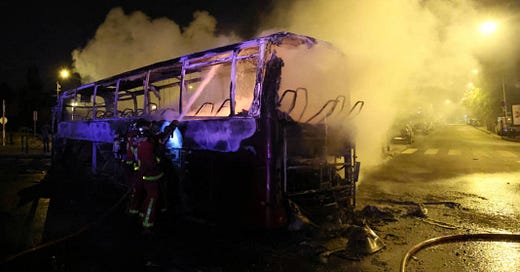The accelerant was the shooting by a police officer of Nahel Marzouk, a 17-year old French youth of Algerian descent in the Paris suburb of Nanterre last Tuesday. The accounts of how his death came about conflict of course, but you can see it here for yourself and be the judge. Much like the killing of George Floyd, where there was a much higher degree of police culpability, it took a few days but then the rioting in response to the killing started and spread all over France. It even crossed borders into Belgium and Switzerland. As the fights and destruction intensified, a jaw-dropping tally of burned buses, libraries, schools and other public facilities emerged, to which we can add endless looting, hundreds of arrests as well an incredible number of seriously injured policemen. An attack on a mayor and his family in particular made the headlines.
The question became: what caused all of this? Nahel’s death? Racism in France? The economy? Islamic resentment against the French state? Or was it all just a pretext to loot and riot? And, any parallels with the violent riots of 2005? Well, we have been here before, so we can make a few comments on it:
France’s Twisted Relationship with the Maghreb - as a former colonial ruler of Northern Africa (Mauritania, Morocco, Algeria, Tunisia aka the Maghreb) France’s exit from its former possessions was not all that easy and actually quite violent. A large pro-independence protest in Paris itself in 1961 ended in a massacre with as of today a still unconfirmed number of dead Algerians, many of whom were tossed into the river Seine by French police. There is no other European colonial power that can lay claim to such a gruesome domestic suppression of its colonial subjects on its own soil. None.
Level of Integration in French Society - and the same goes for how the many North Africans are ultimately treated as many of them crossed the Mediterranean to find work in France, most of course in Paris. No real integration, but separate ghettos emerged (suburbs, the so-called ‘banlieus’) where living conditions are less than optimal. Compared to say the Dutch and the British, who are also not that good at it, the French have not exactly established an overly and warm level of welcome. The French attitudes towards immigrants from its former colonial dependencies are noted for being harsh, and the French police in particular has quite a reputation in this regard.
Macron’s Neo-Liberal Economy - France has seen its fair share of massive protests under president Emmanuel Macron. Prior to the pandemic we had the Yellow Vest protests, more recently the anti-pension reform protests all of them events that played out quite violently over longer periods of time. These protests were driven by regular French middle and lower middle class workers. If these segments are challenged by the economic policies of Macron, you can only imagine how those on the lower end of the scale, the unintegrated immigrants are faring. Not well. What makes things worse is the disconnect between government and those very masses that feel left behind, Macron’s comment that violent video games were a likely cause of the riots were far from helpful.
So the French are dealing with a unique set of circumstances and all the aforementioned aspects interacted in some way. If it was not for the death of Nahel Marzouk, something else would no doubt have set Paris on fire again. Edging closer to a national emergency and cancelling a state visit to Germany, it seems that Macron is losing control of the plot and this is opening the doors to the wildest rumours such as a potential coup by right-wing military officers supported by a frustrated police force. Wild and unsubstantiated maybe, yes, but again we have been here before, only recently when similar reports made the rounds. And with France’s largest political alternative being the ultra-nationalist Front National under Marine Le Pen it is not hard to see how the riots will propel a slide towards right-leaning nationalism, anti-EU sentiments and a demand for real change. In that France does not differ from many other Western European nations.
It needs to be emphasized that there is no evidence of Islamist motives driving the riots this time. Economic discontent, segregation and potentially some thrill seekers who have joined the rioters against a known and brutal French police force created a toxic cocktail of destruction and violence. Listening to various commentators over the weekend it occurred to me that the fears over Muslim immigrants are not nearly as potent as they were in the wake of 9/11. The contrary may actually be true. As Europe’s nationalist right of centre movements increasingly embrace religion and tradition they are also now beginning to see Muslims as partners as they similarly reject the secular liberal values on which for instance Macron’s government is built.
We are a generation further some twenty years after the first notable riots and in other European countries we are seeing immigrants steadily become successful and advance socially and economically. The French immigrant underclass wants access too and it is therefore quite plausible that it is primarily the economy combined with uniquely French attitudes that are driving these riots.
Unwinding this problem will be an issue for the French, but with increasing immigration from North Africa and Asia something all European leaders will need to be on top of. Expect to see more new and unusual political alignments, disconnects and violence all over the old continent in the near future.




10-4